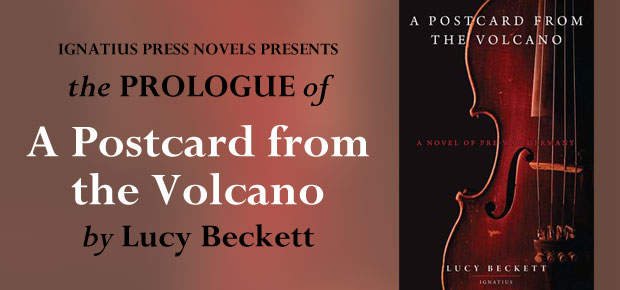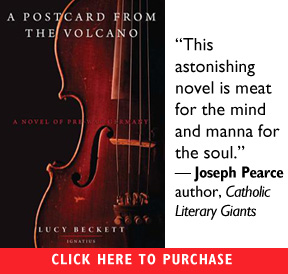
Read the prologue of the novel A Postcard from the Volcano by Lucy Beckett. If you like what you’re reading, visit the novel’s page to learn more or order!
Prologue
In the winter of 1961 Max Hofmann was dying. No one said so, not even the doctor, who seemed to think that the promise of improvement, however empty, was kinder than the truth. But Max knew. At least from time to time, he was quite certain he was dying.
On some days, if he stayed downstairs and sat upright at his desk instead of in a comfortable chair out of which it would be difficult to get, or walked for a few minutes in the garden, he could persuade himself that he was getting better, that ordinary years lay ahead. The leafless garden with its pinched grass and dirty London brick walls: would he see spring arrive there? The purple crocuses? The brash yellow flowers of the forsythia, the brash pink flowers of the cherry? He didn’t like town gardens, especially town gardens planted with English enthusiasm for colour, any colour, the brighter the better. He didn’t think he would see the cherry blossom or the crocuses again. Actually, he knew that he wouldn’t. And that was fine.
His wife fussed in the daytime, and in the evening, as if to hold him back from death, hugged him before he went by himself to bed. His clever, careful son and his high-spirited daughter stopped bickering when he came into the kitchen and from the narrow hall watched him with embarrassed anxiety when he stopped on the stairs to gather a little breath to go up another step.
His favourite pupil came on Thursday at six o’clock, as she used to come for her violin lesson. She was seventeen. She knew. To realism he had accustomed her.
“Where is your fiddle?”
By now he was in bed, sitting upright against four pillows.
“I didn’t bring it.”
“I see. A bad decision. Fetch mine.”
She found it downstairs, tuned it downstairs, carried it up slowly as if it were heavy.
“Play a little.”
“Are you sure? What shall I play?”
“The Bach.”
She was learning one of the solo parts in the double violin concerto. Two weeks ago he played the other part with her, stopping every so often to growl objections to her playing. “Stay on the beat. Most of all when the beat is slow.”
“Ach! The top F was sharp.”
“Listen for me. So, you will not race ahead.”
 She played, by heart, for a few minutes with her back to him, standing at the window looking out over two dark gardens at the lit kitchen window of the house opposite. She reached a cadence and paused.
She played, by heart, for a few minutes with her back to him, standing at the window looking out over two dark gardens at the lit kitchen window of the house opposite. She reached a cadence and paused.
“That is better”, he said. “Bach is for the end. Good.”
She saw a cat jump onto the sill of the lit window. She took the fiddle from her shoulder but didn’t turn round. Standing with violin in one hand, bow in the other, she watched a woman open the kitchen window, let in the cat, shut the window.
“You’re too young to die. People aren’t supposed to die at fifty-five.”
“No. There you are wrong. I am too old already to die. By many years I have outlived my life.”
“You shouldn’t say that. It’s not fair.”
“Probably not. All the same it is the truth. Later you will understand this. Now close the curtains. Come here.”
She shut out the London night and sat on his bed, the violin on her lap. The silence in the room was close and warm, broken only by the soft popping of the gas fire.
“I brought you some flowers.”
“Quite right. Where are they?”
“Jane took them, to put in water. She’ll bring them up with your supper.”
“What kind of flowers?”
“Freesias.”
“From a shop.”
“It’s January.”
“Too expensive.”
He closed his eyes.
“I’m tiring you. Shall I go?”
“I am the one who goes.” He did not open his eyes. “No. Stay. Two things I have to say to you.”
She looked at his hands resting on the eiderdown and wondered again how the broad, blunt fingers of his left hand could fly over and stop with absolute precision the thin strings over the thin fingerboard of his violin. His violin, silent on her lap.
“The fiddle I want you to have. It is what I carried with me. The fiddle I brought and a little satchel of books. But you are not reading German. Nor are my own children, half-German though they may be. Never mind the books. It is a good fiddle. Much better than yours. Many years ago it belonged to a good man. It will improve your playing.”
Her eyes filled with tears. His remained closed. She saw his hands tense, then relax.
“The fiddle. This is simple. It does not matter so much. A violin is just a violin. The other thing is not for you to have. It is for you to do.”
“Anything. Tell me. Anything.”
He looked at her, with a penetrating blue-eyed look she knew well.
“It will be too much for you. Too difficult. You will have your own life. I cannot imagine how your life will be. But it must be your own.”
“Tell me what you want me to do. I’ll try. I really will try my best. I promise.”
He shifted uncomfortably and she moved his pillows so that he could sit up a little. He regained his breath.
“Listen to me. When I left Germany I left my own life. Of course I have not all this time been dead. I came, as you know, in 1933 to my friend the canon and his wife. I was the tutor in the holidays, for their grandsons. I was a terrible tutor at first. These good grandsons taught me English. At the school I was teaching violin to little boys who had no patience. One or two could learn. I am no teacher but what can I do? Who will employ a Prussian lawyer? Then the war, and the camp. For enemy aliens. I am an alien. I am not an enemy. After the beginning this camp is not so bad. There is music. There is German to speak. There is also Jane. She is a nurse in this camp.
“Then some of us are offered to fight Hitler after all. Not as real soldiers but digging latrines, loading trucks. After the war more teaching. Better teaching. Better pupils. You, for example. Jane of course. A home. The children. All this you know. A life. OK. For twenty-seven years I have lived, but—how to say it?—with the left hand. No bowing arm. No sound. Half a life. My own life Hitler took away. That life is only now here.” He tapped his forehead with a thick middle finger. “And even memory is not reliable—how does one know? And will very soon be gone. Pff! Blown out just like that, as one would blow out a candle.”
“No, that’s not true!”
He looked at her sharply. “Isn’t it? God, you mean. God does remember, does know. Well, perhaps. Perhaps indeed. Either way,” he said, “there you are. This is what I give you to do.”
She met his look, but shook her head.
“I don’t understand.”
His face was pale, glistening from the effort of talking. He closed his eyes.
At last he said, “You do. You will. This life that is lost, that will be altogether, finally lost, or not, when I die. You will find it, discover it, even invent it. What is the difference? I leave it to you, what to do to find it, because you have the application and the imagination and the sense for truth. Perhaps imagination and the sense for truth are even after all the same thing.”
“But . . .”
She sat still, thinking.
“I don’t know enough. I will never know enough.”
“Who ever does? You will learn. You will learn enough for what I am giving you to do.”
“But I didn’t know you then, when you were young.”
“You know me now. It is the same.”
“But it’s not, is it? Surely your friends . . .”
“My friends. There is the whole point. They are dead. As, very soon, I also will be dead. There were five of us. Perhaps six, but that you will have to decide. And an old schoolmaster. All of them died. I did not. Only now I die. Open the top drawer, on the left. Yes. Under the socks, and then under the paper. There is a postcard. That’s it. That is for you, to help you, one day when you have grown up and have time for me. It will be many years, but that does not matter. I should have done this myself if I had been by any chance a writer. But I am not, and now after so many years I have no language left to use for what is not simple.”
She was looking at the card. On it was a list of names—seven lines, seven names—with dates and places of birth and death. Only the last name had no date or place of death. “Max Ernst, Count von Hofmannswaldau, born Waldau, Silesia, March 1905.”
He watched her closely as she read the list. When she looked at him he nodded, and smiled.
“That’s it. That’s what you have to start from. Don’t worry. Forget about it now. But don’t lose it. When the right time is arrived, that postcard is all you will need.”
“Is it really a kind of game you want me to play?”
“Of course, silly girl. It is a game and not a game. A story to make up and a story that is true. Listen to me. Those names, they were people. They were alive. They died. And now there is no one to tell their stories, our story, how we were at one place at one time, from different countries, cities, ruined empires. It was partly for the music we made that we were friends. Friends, lovers, rivals, what have you. Then one way or the other, Hitler killed all of us. Or Stalin. Even me. I lived, but was I alive? From time to time perhaps.” Another smile. “The story will be a good one. Quite complicated. The world was a complicated place for us. The story you tell will not have so many facts, but it will have as much truth as if I had been myself the writer, perhaps more because you were not there. Or not yet. Do you understand?”
“I don’t know. I think so.” She saw that it mattered very much that she understood. “Yes, I do understand. I will try. One day I’ll try to do what you want me to do, what you think I can do. I will.”
“Good.”
His eyes closed. His head sank back on the pillows. His face was paler than before and looked both smoother and thinner.
“Now go”, he said very quietly. “I shall sleep now. Good. You are a good child.”
She didn’t see him again. Nine days later, he died.
The funeral service was a Requiem Mass in a nearby Catholic church. His family, a few of Jane’s relations and some pupils and colleagues from the school, none of them Catholic, found the Latin service impossible to follow. There was no sermon, no eulogy; nothing was said about Max or about his life. Strangers carried the coffin down the aisle, and then Jane and the children and three or four others got into cars to follow the hearse to the cemetery. At the house, when the family came back, those of the pupils and colleagues who hadn’t gone home stood about awkwardly with glasses of sherry or cups of tea.
There were sandwiches and slices of fruitcake. An elderly woman, perhaps an aunt, say to Jane, “I never knew Max was a Roman Catholic.”
“Nor did I till a few days before he died. He asked me to fetch a priest. I had no idea how to find one. But there’s a Roman Catholic family two doors down. Five or six children—you know. They brought the local priest to the house that same afternoon. He spent nearly an hour with Max. Goodness knows what they talked about. Yes, the priest was the same one who did the service. Quite a nice man. Very Irish, of course.”
After a few months, Jane sold the house at a good price, for it was in a part of London that was becoming fashionable. She moved with the children to a cottage in Norfolk close to her brother’s house, where she had grown up. Knowing nothing of Max’s wish, she also sold his violin, for a good deal of money.
A violin is just a violin.
If you like what you’re reading, visit this novel’s page to learn more or order!






Leave a Reply